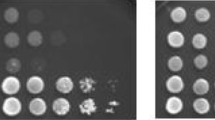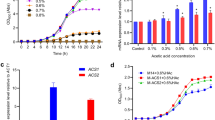Abstract—Ethanol is one of the most important biotechnological compounds widely used in medicine, pharmacology, food and fuel, cosmetology, and other fields. The main method for ethanol production is alcoholic fermentation using baker’s yeast Saccharomyces cerevisiae. S. cerevisiae converts glucose into ethanol very efficiently: ethanol yield is more than 90% of the theoretical maximum. However, even a slight increase in ethanol yield in an industrial-scale alcoholic fermentation can produce an additional 100 million t of ethanol each year. In this study, the method of adaptive evolution was used to increase the production of ethanol with industrial S. cerevisiae strains: yeast cells were exposed to long-term cultivation on the medium with high concentrations of glucose and ethanol. Most of the adapted strains obtained were characterized by increased ethanol production during alcoholic fermentation in comparison with the original strains.






Similar content being viewed by others
REFERENCES
Dmytruk K.V., Kurylenko O.O., Ruchala J., Abbas, C.A., and Sibirny A.A. Genetic Improvement of Conventional and Nonconventional Yeasts for the Production of First- and Second-Generation Ethanol, Springer International Publishing, 2017. https://doi.org/10.1007/978-3-319-58829-2_1
Basso, L.C. Basso, T.O., and Rocha, S.N., Ethanol Production in Brazil: The Industrial Process and Its Impact on Yeast Fermentation, InTech, 2011.
Hahn-Hagerdal, B., Galbe, M., Gorwa-Grauslund, M.F., Liden, G., and Zacchi, G., Bio-ethanol—the fuel of tomorrow from the residues of today, Trends Biotechnol., 2006, vol. 24, no. 12, pp. 549–556. https://doi.org/10.1016/j.tibtech.2006.10.004
Dos Santos, M.A., Energy Analysis of Crops Used for Producing Ethanol and CO2 Emissions, The International Virtual Institute of Global Change (IVIG), 1997.
Douglas Crabb, W. and Mitchinson, C., Enzymes involved in the processing of starch to sugars, Trends Biotechnol., 1997, vol. 15, pp. 349–352. https://doi.org/10.1016/S0167-7799(97)01082-2
Madson, P.W. and Monceaux D.A., Fuel Ethanol Production, Nottingham: University Press, 1999.
Guo, Z.P., Zhang, L. Ding, Z.Y., and Shi, G.Y., Minimization of glycerol synthesis in industrial ethanol yeast without influencing its fermentation performance, Metab. Eng., 2011, vol. 13, no. 1, pp. 49–59. https://doi.org/10.1016/j.ymben.2010.11.003
Zhang, L., Tang, Y., Guo, Z.P., Ding, Z.Y., and Shi, G.Y., Improving the ethanol yield by reducing glycerol formation using cofactor regulation in Saccharomyces cerevisiae,Biotechnol. Lett., 2011, vol. 33, no. 7, pp. 1375–1380. https://doi.org/10.1007/s10529-011-0588-6
Semkiv, M.V., Dmytruk, K.V., Abbas, C.A., and Sibirny, A.A., Increased ethanol accumulation from glucose via reduction of ATP level in a recombinant strain of Saccharomyces cerevisiae overexpressing alkaline phosphatase, BMC Biotechnol., 2014, vol. 14, p. 42. https://doi.org/10.1186/1472-6750-14-42
Semkiv, M.V., Dmytruk, K.V., Abbas, C.A., and Sibirny, A.A., Activation of futile cycles as an approach to increase ethanol yield during glucose fermentation in Saccharomyces cerevisiae, Bioengineered, 2016, vol. 7, no. 2, pp. 106–111. https://doi.org/10.1080/21655979.2016.1148223
Grossmann, M., Kießling, F., Singer, J., Schoeman, H., Schröder, M.-B., and von Wallbrunn, C., Genetically modified wine yeasts and risk assessment studies covering different steps within the wine making process, Ann. Microbiol., 2011, vol. 61, no. 1, pp. 103–115. https://doi.org/10.1007/s13213-010-0088-2
Chambers, P.J., Bellon, J.R., Schmidt, S.A., Varela, C., and Pretorius, I.S., Non-Genetic Engineering Approaches for Isolating and Generating Novel Yeasts for Industrial Applications, Springer Netherlands, 2009. https://doi.org/10.1007/978-1-4020-8292-4_20
Cakar, Z.P., Seker, U.O., Tamerler, C., Sonderegger, M., and Sauer, U., Evolutionary engineering of multiple-stress resistant Saccharomyces cerevisiae,FEMS Yeast Res., 2005, vol. 5, no. 6–7, pp. 569–578. https://doi.org/10.1016/j.femsyr.2004.10.010
Kuyper, M., Toirkens, M.J., Diderich, J.A., Winkler, A.A., van Dijken, J.P., and Pronk, J.T., Evolutionary engineering of mixed-sugar utilization by a xylose-fermenting Saccharomyces cerevisiae strain, FEMS Yeast Res., 2005, vol. 5, no. 10, pp. 925–934. https://doi.org/10.1016/j.femsyr.2005.04.004
Higgins, V.J., Bell, P.J., Dawes, I.W., and Attfield, P.V., Generation of a novel Saccharomyces cerevisiae strain that exhibits strong maltose utilization and hyperosmotic resistance using nonrecombinant techniques, App. Environ. Microbiol., 2001, vol. 67, no. 9, pp. 4346–4348. https://doi.org/10.1128/AEM.67.9.4346-4348.2001
Dmytruk K.V., Kshanovska, B.V., Abbas, C.A., and Sibirny, A.A., New methods for positive selection of yeast ethanol overproducing mutants, Bioethanol, 2016, vol. 2, pp. 24–31. https://doi.org/10.1515/bioeth-2015-0003
de Oliva-Neto, P., Dorta, C., Carvalho, A.F., de Lima, V.M.G., and da Silva, D.F., The Brazilian Technology of Fuel Ethanol Fermentation—Yeast Inhibition Factors and New Perspectives to Improve the Technology, ©FORMATEX, 2013.
Chapman, C. and Bartley, W., The kinetics of enzyme changes in yeast under conditions that cause the loss of mitochondria, Biochem. J., 1968, vol. 107, no. 4, pp. 455–465. https://doi.org/10.1042/bj1070455
Beaven, M.J., Charpentier, C., and Rose, A.H., Production and tolerance of ethanol in relation to phospholipid fatty-acyl composition in Saccharomyces cerevisiae NCYC 431, Microbiology, 1982, vol. 128, no. 7, pp. 1447–1455. https://doi.org/10.1099/00221287-128-7-1447
Millar, D.G., Griffiths-Smith, K., Algar, E., and Scopes, R.K., Activity and stability of glycolytic enzymes in the presence of ethanol, Biotechnol. Lett., 1982, vol. 4, no. 9, pp. 601–606. https://doi.org/10.1007/BF00127792
Loureiro-Dias, M.C. and Peinado, J.M., Effect of ethanol and other alkanols on the maltose transport system of Saccharomyces cerevisiae,Biotechnol. Lett., 1982, vol. 4, no. 11, pp. 721–724. https://doi.org/10.1007/BF00-134666
Ingram, L.O., Adaptation of membrane lipids to alcohols, J. Bacteriol., 1976, vol. 125, no. 2, pp. 670–678. PMCID: PMC236128.
Moon, M.H., Ryu, J., Choeng, Y.-H., Hong, S.-K., Kang, H.A., and Chang, Y.K., Enhancement of stress tolerance and ethanol production in Saccharomyces cerevisiae by heterologous expression of a trehalose biosynthetic gene from Streptomyces albus,Biotechnol. Bioproc. Eng., 2012, vol. 17, no. 5, pp. 986–996. https://doi.org/10.1007/s12257-012-0148-5
Qiu, Z. and Jiang, R., Improving Saccharomyces cerevisiae ethanol production and tolerance via RNA polymerase II subunit Rpb7, Biotechnol. Biof., 2017, vol. 10, p. 125. https://doi.org/10.1186/s13068-017-0806-0
Jung, Y.J. and Park, H.D., Antisense-mediated inhibition of acid trehalase (ATH1) gene expression promotes ethanol fermentation and tolerance in Saccharomyces cerevisiae,Biotechnol. Lett., 2005, vol. 27, nos. 23–24, pp. 1855–1859. https://doi.org/10.1007/s10529-005-3910-3
Cao, T.S., Chi, Z., Liu, G.L., and Chi, Z.M., Expression of TPS1 gene from Saccharomycopsis fibuligera A11 in Saccharomyces sp. W0 enhances trehalose accumulation, ethanol tolerance, and ethanol production, Mol. Biotechnol., 2014, vol. 56, no. 1, pp. 72–78. https://doi.org/10.1007/s12033-013-9683-3
Thammasittirong, S.N.-R., Thirasaktana, T., Thammasittirong, A., and Srisodsuk, M., Improvement of Ethanol Production by Ethanol-Tolerant Saccharomyces cerevisiae UVNR56, SpringerPlus, 2013. https://doi.org/10.1186/2193-1801-2-583
Argueso, J.L., Carazzolle, M.F., Mieczkowski, P.A., Duarte, F.M., Netto, O.V. Missawa, S.K., Galzerani, F., Costa, G.G., Vidal, R.O., Noronha, M.F., Dominska, M., Andrietta, M.G., Andrietta, S.R., Cunha, A.F., Gomes, L.H., Tavares, F.C., Alcarde, A.R., Dietrich, F.S., McCusker, J.H., Petes, T.D., and Pereira, G.A., Genome structure of a Saccharomyces cerevisiae strain widely used in bioethanol production, Genome Res., 2009, vol. 19, no. 12, pp. 2258–2270. https://doi.org/10.1101/gr.091777.109
Lin, Y. and Tanaka, S., Ethanol fermentation from biomass resources: current state and prospects, Appl. Microbiol. Biotechnol., 2006, vol. 69, no. 6, pp. 627–642. https://doi.org/10.1007/s00253-005-0229-x
Esteve-Zarzoso, B., Belloch, C., Uruburu, F., and Querol, A., Identification of yeasts by RFLP analysis of the 5.8S rRNA gene and the two ribosomal internal transcribed spacers, Int. J. Syst. Bacteriol., 1999, vol. 49, no. 1, pp. 329–337. https://doi.org/10.1099/00207713-49-1-329
Funding
This study was supported by the National Academy of Sciences of Ukraine (scientific and technical project of the National Academy of Sciences of Ukraine no. 44-18 Development of Ethyl Alcohol Technology Based on Designed Alcoholic Yeast Strains Capable of Overproduction of Ethanol).
Author information
Authors and Affiliations
Corresponding author
Ethics declarations
The authors declare that they have no conflict of interest. This article does not contain any studies involving animals or human participants performed by any of the authors.
Additional information
Translated by V. Mittova
About this article
Cite this article
Zazulya, A., Semkiv, M., Dmytruk, K. et al. Adaptive Evolution for the Improvement of Ethanol Production During Alcoholic Fermentation with the Industrial Strains of Yeast Saccharomyces Cerevisiae . Cytol. Genet. 54, 398–407 (2020). https://doi.org/10.3103/S0095452720050059
Received:
Revised:
Accepted:
Published:
Issue Date:
DOI: https://doi.org/10.3103/S0095452720050059




